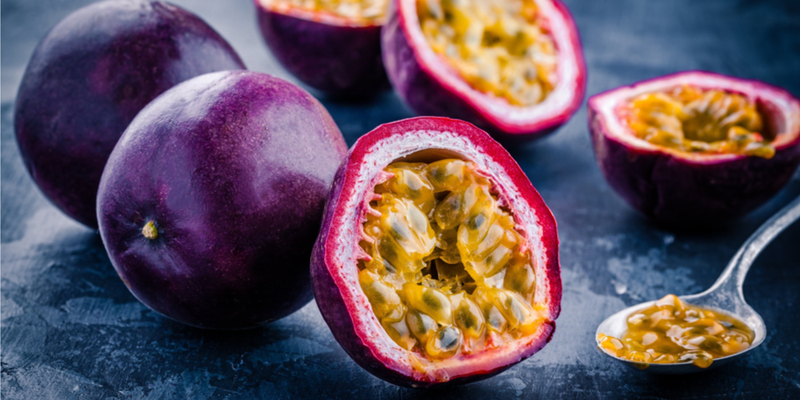The Health Benefits of Passionfruit
Originally native to South America, this tropical fruit has a thick yellow or purple skin that’s inedible, but look inside and you’ll find hundreds of sweet, tart and aromatic seeds. In this post, we talk about the health benefits of passion fruit and how you make the most of a passionfruit so you can enjoy these health benefits.
Immunity
Passion fruits are rich in Vitamin C and Vitamin A. Vitamin C helps the body gain resistance against infectious agents and pro-inflammatory free radicals. Studies have shown that vitamin C, stimulates the activity of white blood cells and the rest of the immune defense system, thereby protecting you from common illnesses and serious diseases at the same time. Vitamin A and the flavonoid antioxidant, beta carotene, is also found in abundance in passionfruit. They support good eyesight, healthy mucus membranes, and healthy skin.
Digestive Health
Passion fruits are a very strong source of fiber, which is an essential component of a health diet, since it is the substance that facilitates healthy digestion of food and the regulation of bowel movements. It can reduce signs of constipation by regulating bowel movements, scrubs the blood vessels clean of excess cholesterol, and even prevent gastrointestinal conditions like colorectal cancer!
Insomnia
It contains medicinal alkaloids, including harman, which functions as a sedative. This compound has been connected to a reduction in restlessness, insomnia, sleeplessness, and nervous anxiety which can keep you from getting a good night’s rest.
Counteracts High Blood Pressure
Having high potassium content with almost no sodium makes Passion fruit highly effective in protecting from high blood pressure. Potassium regulates electrolyte balance and controls the muscle function of our entire body including our heart muscles; it also prevents the release of calcium into the bloodstream that can cause blockages in the arteries if released in excess; these function of potassium make it an indirect factor that regulated optimum blood pressure in the body.
Side Effects
Though it’s a healthy fruit that can rarely endanger anyone, there are a few points about them to keep in mind:
- The sedative property of passion fruit can lead to intervention with drugs. If you’re already on medicines for depression and anxiety, talk to you doctor or dietician about the permissible dosage of fruit.
- Similarly, excessive alcohol and passion fruit should be avoided as they make your reflexes extremely sluggish, even if for a short while.
- Don’t take aspirin with Passion fruit as it can enhance the effect of this medicine which can dilute the blood excessively. Passion fruit has a pro-anticoagulant property which leads to negative fall out with aspirin which is an anti-coagulant.
Here are some ideas to prepare passion fruit:
- Beverage: it can be squeezed through a sieve to make juice, added to cocktails or used a cordial to flavour water.
- Desserts: perfect fresh atop a pavlova or a cheesecake
- Salads: It can be used to add in a crunchy texture and a sweet element to your salad.
- Yoghurts: Mix it with natural yoghurt and it makes a fantastic snack
Storing Tips
- Place unripened passion fruit in a brown paper bags, it will take a couple of days for fruit to ripen.
- Place ripe passion fruit in the fridge. Keep it in the fridge for best outcomes.
- Store the passion fruit for approx. 2 weeks
- You can also free the pulp. Scoop the pulp into a bowl then transfer into ice cube trays. Frozen passion fruit can keep for approx. 8 months.
